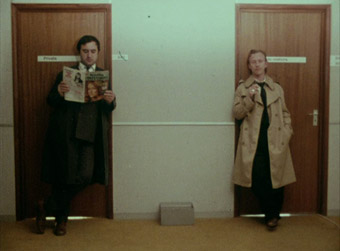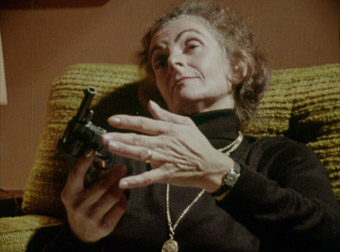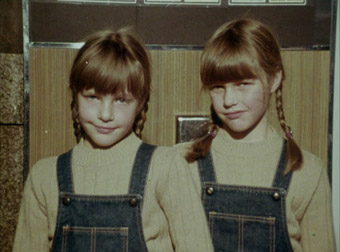According to one of the tenets prefacing Oscar Wilde's The Picture
of Dorian Gray. "All criticism is autobiography." The readers'
conscious/unconscious perceptual focuses highlight various textual
aspects through the prism of which other details are organized. |
|
Uh, OK. Criticism is autobiography. I find the logic impeccable. It's hard to argue with the fact that criticism of any kind is a collection of personal tastes and prejudices colliding with a work offered up for debate. Can there be anything approaching objective criticism or even 'truthful' criticism? There is purpose and value as it is a form of communication and we rely on a foretaste of an experience to make a judgement to indulge or not. On this site the 'criticism' is fundamentally a positive push offered to films that usually go under the mainstream radar. Yes, we have negative hic-coughs when faced with clichéd horror, mainstream wasteful stupidity and its synonym, Michael Bay, but on the whole our criticism is embedded in passion and enrolment. We loved this, go and love it too! Personally I think that canny marketing has more to do with the success of a movie than critical approval but if you get to know your humble critic's tastes, you can usually make a reasonably accurate assessment of the chance of how well you'll respond to the work. I only say this up front because I'm about to delve into an area of film I was broadsided by and continue to be royally flummoxed towards. Let's use the word 'art' and never speak of it again (until the next paragraph).
As Laurie McFadden said years later 'Back then there didn't seem to
be anything more exciting than just putting a roll of film in a camera. |
From Chris Monger's Introduction
to the Blu-ray of Voice Over |
That, to my mind, says it all. It's just we're not 'back then' anymore. We are now technically awash with the ability to make a film. Is that good, bad or just different (not less)? There was certainly a reverence for film because of the huge effort and expense it took to practically make one. While in college, one of the older students violently berated me for actually touching a precious Acmade Compeditor (a multi-track playback machine used to assemble a 16mm film separate magnetic soundtrack). My film employment then was looking after the empty, silver box – the one in which the Arriflex camera belonged. I was also the guy the lighting cameraperson stood on to make adjustments to lights out of reach. Talk about being on the bottom rung of the film career ladder. But to me there was great excitement in even that lowly position. Why? I was actually on the damn ladder. There is now more picture quality – and more importantly – opportunity in the pockets of well-off teenagers than I could dream about at their age.

Part of the romanticism of that superior but much-maligned format was the fact you had to wait while it was processed to see if you'd got what you think/hoped/prayed you'd shot. It gave working with film that extra frisson. It was physical, visceral, cans were heavy, editing dirty and to tell which side was the emulsion and which side was the base, you kissed it, held it between your lips and whichever side stuck to your lip was the emulsion. How many ways to communicate necessitate a kiss to get it the right way up? OK, I too can think of one other but that's one-to-one (or a few more if you're really adventurous) not one-to-many. People now may see processing as an unnecessary delay in the creative process but it was profoundly inherent in the medium. Viewing rushes was also fraught with possible disappointment, delight and creative potential. So I can share Laurie's sentiment right down to the last sprocket. If you will indulge me a little topic hopping (I assure you that it will all come together in the end) I will try to make it worth your while.
Role models are important.
My mother knew that. If you have a child with a very unusual and specific ambition, one he was crazy about, it probably wasn't a good idea to rely on the system to send him on his merry. Careers Advice in high schools in the late 70s was acutely narrow. Girls learned to type and boys chose between office or manual labour. I wanted to be a filmmaker so I was directed (hah!) towards photography in further education. The college and I weren't a great match though some personal and important things came out of the experience, the administrator of this site for one. There was only one bona fide film school in the UK at that time and my chances of entry were small due to my age and inexperience. I still maintain I would have been the best film student if I'd been given a chance but the National Film and Television School wasn't biting. I believe they didn't have the 'Television' part in their title in those days, "television", euw. I think I applied about four times and had my chances for a fifth scuppered after my mother, bless her, wrote the admissions department an angry letter. But she found another way to shore up support for a film-obsessed teen that harboured no other ambition.

A friend of hers was teaching at Cardiff College Of Art where Christopher Monger was lecturing so she turned up at Chris's door and set up a meeting. Chris hadn't made Voice Over yet and was in the full bloom of his creative awakening (if that's not too fey an image). But here's the thing. I'd never met a filmmaker before (Chris probably would say I'd not met one then either) despite my ambitions and Chris's flat was liberally littered with film and art, so much so that sections of his now lost-in-a-fire ex-abode exist only in my head. Here was someone a decade older than me but with that same recognisable fire (not the one that torched his flat). Again, this is probably news to him but his inspiration at that time propelled me forward in ways he probably couldn't have imagined (not true, the man has a galactic imagination). He introduced me to the classic filmmaking book Truffaut Hitchcock, a tome that laid down movie making principles that I felt but could not have articulated. Imagine my self-taught frenzy of gathering every book on film I could afford. But try as I might to appreciate the odd Godard on the box, I was a mainstream movie junkie and it was a great time to be such as Hollywood hadn't got its hands on the computer yet.
I just didn't 'get' art movies or film perceived to be artistic in the same way any other art was. I attended many screenings at the Chapter Arts Centre in an effort to broaden my hardly catholic tastes and while I'm not apologising for them, they kept me free from the delight that seemed to ripple through so many in the audience. It was like hypnotism and alas, even though I've tried a few sessions to cure my fear of flying, it seems I'm somewhat immune to its benefits. I once sat through what seemed like hours of a film that was simply the sight of an American road from the windscreen of a moving car. Every so often words would flash up. It was all I could do not to point at the screen and ask someone if they could actually describe the emperor's new clothes to me. But I had Chris to rely on. Chris seemed to straddle the mainstream and art with some ease and with a thrill, I remember sitting down to see his movie, Repeater, the extra feature on the Voice Over DVD and Blu-ray.
Uh oh.

Inspired by the French 'nouvelle vague', Repeater is a movie about different perspectives. After dictating her philosophic insights into a cassette recorder, a woman turns up at a police station to admit to a mercy killing. In the interrogation room next to her a suspect is accused of being a hit-man and hang on, isn't that Alexei Sayle? I had the very uncomfortable feeling of drowning in incomprehension. But this was Chris' film. I had to reconcile the man with the art (an arguably ambivalent mistake as both should stand apart to some degree) and I found the art baffling to the point of self-doubt. I couldn't 'see' or 'get' what I felt I should be seeing and getting. It was a movie projected in front of me but so many tent poles were either missing or deliberately skewed, it was like trying to read a compass while embedded inside a magnet. There's even a line of dialogue addressed to the camera by a character played by Roland Denning, Chris's cameraperson; "This isn't cinema! … Where is, in a word, the emotion?" At least that line helped me to understand that all bets were off and we were in the dangerous land of art where I stood but did not belong.
I came out of that screening believing that I'd never truly appreciate this 'other' side of cinema and that its merits were beyond me. And then Chris made Voice Over. Well, it's certainly not a mainstream movie by any criteria but I got it! It was the perfect bridge between worlds and it was after 1983 I started to expand my cinematic horizons. I'd then gladly watch anything without that crippling sense of inadequacy and take it as I saw/experienced it. That is until I stayed up one night and settled in to see a surrealistic classic being shown on TV for the first time. I was excited. I even knew what surrealism meant (I had its definition written on an piece of paper taped to my wardrobe). I was goggle eyed at the visual inventiveness of this classic short and even though I was warned of a certain part, I was rapt. And then the cloud passed over the moon, the razor was sharpened and as the woman's eye was held open 'Ludwig Treatment' style, the razor sliced the eye open horizontally and the pit of my stomach hit the floor and my mind did that somersault of repulsion. I've not been able to see any brutal, cinematic treatment of eyes since that moment. Don't you just love cinema that damages you?
Thanks Luis! And thank you, Chris. It was art of a sort and, at last, my sort of art. |